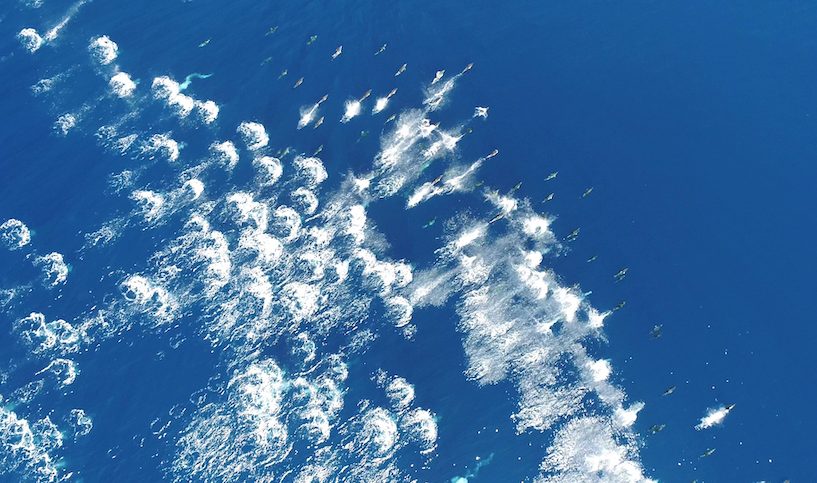“Ever since I was young, I have been in love with the sea. I think it is the most beautiful treasure that Kuwait has,” Fadia Al Abbar gushes. She has recently returned to her half-native Kuwait amidst her research journey as a marine biologist. While conducting research on the well-being of vulnerable ocean mammals, Fadia also dabbles in wildlife photography during her adventures, taking her camera with her whenever she sees the chance of taking some pictures in nature.
“Growing up in Kuwait means being close to the sea, which made me want to protect what I love.” This is the ethos which fueled Fadia to finish her Bachelor’s degree in environmental science and obtain a masters degree in Marine Ecology. But for Fadia, this wasn’t enough. There are still many questions she had regarding the well-being of the more vulnerable ocean mammals, specifically whales and dolphins.
Fadia had a better picture of which natural areas have been most in trouble. Unfortunately, her favorite areas, seas and oceans, including her hometown’s were of the most threatened. “Trash and in particular plastics, pollution, noise, habitat degradation, mining, and industries are threatening marine life. This shock made me want to protect what I love most.” And so, her research journey began.
These days, while Fadia is working on her PhD in the Azores, an archipelago of islands off Portugal, researching the most vulnerable species such as dolphins, she has also been casting a wider net with her research, finding ways to explore further and discovering the trends of troubled mammals among other shores. During our sobering (and we won’t lie, slightly terrifying) conversation filled with factoids about marine life and the dangers they are facing in their livelihood at the moment, as well as the possible extinction of certain marine animals and the age-old question “what are we doing wrong?” Fadia educates us in a way that makes us realize we need to re-evaluate our choices when it comes to keeping the serenity, beauty and magic of the ocean alive during our time.

Hi Fadia! What’s the main focus of your studies right now?
In the Azores, I am studying the common dolphins’ behavioral reactions to boats, particularly the tourist boats. I am using a drone and acoustic instrument (like an underwater microphone) to study their behavior. Whale and dolphin watching trips are incredibly great ways to get close to animals in their natural habitat. This option is much more ethical and dolphin-friendly than to buy a ticket to captivity where dolphins suffer in a small tank.
However, even tourism can get out of control and pose a threat to dolphins when there are too many boats. So where is the balance?
How can we make sure we go on holiday without harming the animals that we love to see so much? This is something that I am interested in understanding, by studying their behavior.
Is your work exclusive to oceans, or do you think there’s room to extend research to the Arabian Gulf, more specifically the shores of Kuwait?
Definitely! Kuwait has dolphins, just not so many people know about it! In my research project for my PhD, we use an underwater microphone acoustics device that we pull behind our boat. By a boat, and pulling the acoustic device behind us, we can tell what noise levels are found in the Gulf, and we can also detect whistles and clicks of dolphins if they are nearby enough. By listening underwater, we can detect where the dolphins are up to 2km in distance! My father has memories of seeing whales and dolphins just from the beaches in Kuwait when he was a child, in the 1950s. He described them as rounded black backs surfacing in the distance, and called them duqs. Today, this is extremely rare. Today we need to go out further offshore to see the dolphins. Why is this? Is there something disturbing them near the coastline? These are questions that we can ask ourselves in Kuwait. Wouldn’t it be amazing to bring the whales and dolphins back near the beaches of Kuwait?
Have you been studying the shores of Kuwait, as a Kuwaiti marine biologist?
I have connected with a scientist Yusuf Bohadi, who is currently the only person in Kuwait doing his PhD on the population of dolphins in Kuwait. He is identifying each individual dolphin, and he studies the dead whales and dolphins that strand on the beaches to understand why they have died. I went on a boat trip with him in April this year to see if we could find some dolphins and explore new ideas. We have started a collaboration and hope to expand the research on dolphins in Kuwait!

How do you think your work can help Kuwait in the long run?
My work can help Kuwait by bringing awareness to the beauties that are in nature, and to understand more about the effect of human activities on dolphins and other animals. I believe that Kuwait has a lot to still explore, and there are not many countries in the world where dolphins remain entirely unexplored, as in Kuwait. So, Kuwait is definitely a hot spot for future research. As a scientist, I am intrigued by the unknown and what has not been studied before. Who knows what goes on in the lives of the dolphins in Kuwait. Kuwait has many gems in nature that deserve way more importance than they are currently given. People worldwide would die to see dolphins in the wild, to see Kingfishers and Parrots in their backyard, and to see Flamingos along the coast. Yet, in Kuwait, they are just there!
Tell us something extremely special about marine life that we wouldn’t know.
Did you know that dolphins are extremely intelligent? They have the capability of recognizing themselves in a mirror! The only other species that are capable of doing this are great apes and, well, us humans! This incredible capability shows that dolphins are aware of themselves. This is partly why it is so cruel to have dolphins in tanks. That is the same as keeping a human in prison where they are not free. Dolphins are too smart, and truly deserve protection and freedom.
Dolphins, such as orcas (yes they are a dolphin species too!) and bottlenose dolphins are intelligent top predators that hunt fish, squids and other marine life, and do not have any natural predators (apart from the fact that orcas can technically kill any other animal in the ocean, including other dolphin species).
Top predators have very important roles in keeping an ecosystem in balance. Since dolphins are mammals and need to breathe air at the surface, they can be considered species that are accessible for us to study. Dolphins can be used for us to understand how healthy the sea is. For example, if a dolphin is skinny, it could be that there are not enough fish to keep it healthy, which might mean there are also not enough fish in the sea for us. If many dolphins strand themselves, or come to the beach to die, it can be a sign that something is threatening them, such as loud noises underwater. If dolphins are found entangled in nets, it can mean that the fisheries are not using legal nets, or that many nets are lost at sea, called ghost nets, threatening dolphins and other wildlife. So you can see that there are countless ways that we can study dolphins, and that we can help to protect them and the sea by understanding them better.

What advice can you leave us with when it comes to being mindful about the well-being of marine life, especially the dolphins?
Keep the dolphins free and in the wild! Keeping dolphins enclosed in walls, or in captivity, is an extremely torturous thing to do. Dolphins can travel hundreds of kilometers in a day and swim up to 200m in depth. No such tank can compensate for the space that dolphins need to survive. Dolphins also communicate by emitting echolocation, these are sounds that they also use to find their way and to find fish. In a tank, their echolocation continuously echoes back on the walls, driving them mad. So instead, dolphins turn silent. Dolphins are social animals that need to live in groups and communicate amongst each other, just as humans do. Dolphins are sentient animals and, just as humans who are enclosed in a small space, dolphins have shown to become depressed and pose self-harm in captivity. If you want to see dolphins, go out on a boat, and enjoy them in their natural environment from a distance, and do not disturb them, it is possibly the best thing that you could do for dolphins. If you truly love dolphins, avoid going to see dolphin shows in a tank.
Follow Fadia’s wild and marinelife photography on Instagram: @fads.sea.photography, and her PhD project on dolphins on Instagram:
@azores.delphis.project. And website: https://azoresdelphisproject.wixsite.com/project You can also follow Yusuf Buhadi’s research @wdpt_q8.








